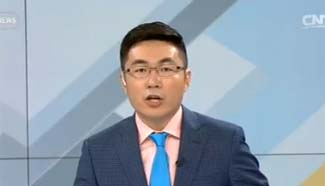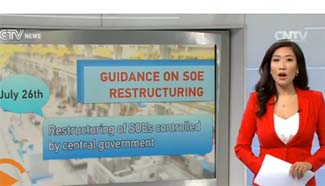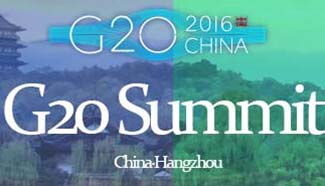HANOI, Aug. 28 (Xinhua) -- The Association of Southeast Asian Nations (ASEAN) and China have developed a growing practical cooperation in the past 25 years of ties, an expert on regional affairs told Xinhua in Vietnam's capital of Hanoi recently.
"During the 25 years, ASEAN and China have focused on practical issues where the two sides see the necessity to cooperate with each other," Associate Professor, Nguyen Thu My, former Deputy Director of the Institute for Southeast Asia Studies (ISEAS) under the Vietnam Academy of Social Sciences told Xinhua.
According to My, who spent 38 years working at the ISEAS, economic cooperation has dominated the backdrop of the ASEAN-China cooperation, which helps boost trade and economic relations, and contributes to promoting economic development in ASEAN.
Since 2009, China has become the biggest trading partner of ASEAN while the group has been the third major trading partner of China since 2011. Although there have been several existing problems including ASEAN's deficit in trading with China, economic cooperation is still the focus in ASEAN-China ties, said the expert.
"The ASEAN-China Free Trade Area (ACFTA), which took effect in 2010, has seen ASEAN become China's third largest trade partner after the United States and the European Union. This is one of the motivations for ASEAN economic development," My said.
"However, due to its strong competitiveness, the benefits of bilateral trade seem to be in favor of China. Chinese products have penetrated strongly into ASEAN markets thanks to tariff preferential while the position of ASEAN commodities in the Chinese market does not commensurate with the bilateral ties, with trade deficit being a major issue," the expert explained.
My said the upgraded version of ACFTA reached in 2015 is set to fix the current trend in bilateral trade. "The upgraded version of ACFTA is expected to bring more benefits to ASEAN countries, improve the trade deficit situation, create more favorable conditions for ASEAN products to enter the Chinese market, thus providing fresh momentum for economic development," My said.
In the book "25 years of ASEAN-China ties: Process, Achievements and Problems" published in 2016, of which My is the main author, the relationship between ASEAN and China is described as having developed quickly since its establishment. The ties have been elevated to a strategic partnership in the shortest period of time compared to ties of ASEAN with other partners, according to the book.
Many initiatives and proposals have been put forward by China for the development of bilateral ties, including the building of the ASEAN-China community of common destiny, establishment of Asian Infrastructure Investment Bank (AIIB), and the 21st century maritime Silk Road, among others.
Though there have been cautious approaches by several countries to some initiatives, most of them have received positive responses from ASEAN members.
Taking the AIIB for example, My said that both sides have seen their interests in infrastructure met as ASEAN is implementing the master plan of connectivity among its members, while China is in need of linking with ASEAN countries in order to facilitate trade and investment.
China has said the AIIB will give priorities for ASEAN countries investing in infrastructure. ASEAN countries welcome the establishment of the AIIB and have become founding shareholders of the bank with the hope of having more opportunities in accessing investment sources for infrastructure development, My said.
In addition to trade and economic ties, culture, tourism and education-linked relations between ASEAN and China have also seen development. Chinese movies have been welcomed in the ASEAN market, including Vietnam. Many Confucius Institutes of China have been set up in ASEAN countries, while China has become a major source of tourism for ASEAN.
China has, in addition, been helping ASEAN members in building production capacity, tackling climate change, and assisting in multiple other areas in which ASEAN has shortcomings, My told Xinhua. China has supported ASEAN in human resources training and sponsored cooperation funds with ASEAN to build up capacity for the association in regional and international integration, as well as in handling other issues, such as security and climate change, she said.
In general, since its establishment, the relationship between ASEAN and China reached its peak in the 2003-2006 period after the two sides lifted their relations to that of strategic partnership for peace and prosperity, said the expert.
China is the first partner to establish a strategic partnership with ASEAN while ASEAN is the first regional cooperation organization that China has set up a strategic partnership with. ASEAN-China relations developed rapidly based on mutual trust. In this period, many ASEAN leaders saw China as a big brother and one who can be counted on.
However, recently, the bilateral ties have been unexpectedly affected by disputes at sea between several ASEAN countries and China, My said, adding that if the two sides can balance their interests, then the relationship between ASEAN and China will continue to develop well.
Future development of the ties depends on numerous factors, yet essentially China needs good relations with Southeast Asian countries and vice versa. It is forecast that the year 2016 will be a good year for ASEAN and China relations, said the expert.










